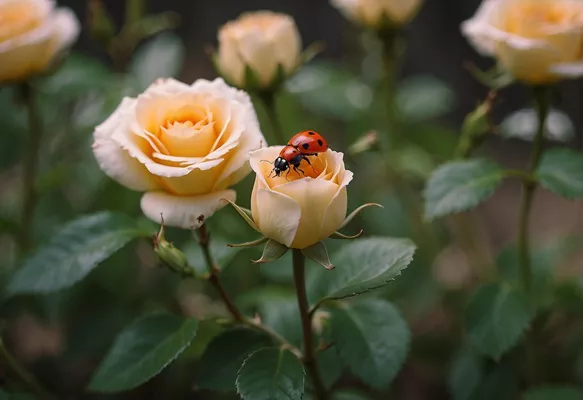Roses are beautiful flowers that can make any garden look stunning. However, beetles can be a big problem for rose growers. They feed on the leaves, buds, and petals, leaving your roses damaged. If you want to protect your roses, you need to take proper action. In this article, we will explore how to keep beetles away from your roses using natural, chemical, and preventive methods.
What Types of Beetles Attack Roses?
Before you start protecting your roses, it is important to identify the beetles that are causing the damage. Different types of beetles feed on roses, but the most common ones include:
Japanese Beetles (Popillia japonica)
These metallic green beetles with copper-colored wings are one of the worst pests for roses. They feed on the leaves and flowers, creating a skeletonized appearance. Japanese beetles are most active in summer and can cause severe damage.
Rose Chafers (Macrodactylus subspinosus)
Rose chafers are light brown beetles that appear in late spring and early summer. They are known to chew on rose petals and leaves. These beetles are especially common in sandy soils.
Cucumber Beetles (Diabrotica spp.)
Though they primarily target cucumbers and other vegetables, cucumber beetles sometimes feed on rose blossoms. They have yellow bodies with black spots or stripes.
Fuller Rose Beetles (Naupactus cervinus)
These small, grayish-brown beetles are nocturnal and chew ragged holes in rose leaves. Unlike Japanese beetles, they do not fly but can crawl up stems and branches.
How to Prevent Beetles from Attacking Your Roses
Prevention is the best way to keep beetles away from your roses. By making your garden less inviting to these pests, you can avoid serious infestations. Here are some effective ways to prevent beetles from damaging your roses:
Use Row Covers
Floating row covers can act as a physical barrier that prevents beetles from reaching your roses. These covers allow sunlight and water to reach the plants while keeping pests away. However, row covers should be removed when flowers need pollination.
Choose Resistant Rose Varieties
Some rose varieties are less attractive to beetles. Hybrid tea roses and certain shrub roses tend to suffer more damage, while rugosa roses and some old-fashioned varieties are more resistant. Research which varieties work best in your area.
Keep Your Garden Clean
Beetles lay eggs in the soil, and their larvae develop underground. Removing plant debris, fallen leaves, and weeds can reduce beetle populations. Regularly tilling the soil can also expose larvae and pupae to predators.
Encourage Natural Predators
Many birds, insects, and animals feed on beetles. Encourage natural predators like:
- Birds (e.g., robins, blue jays)
- Parasitic wasps
- Nematodes (which kill beetle larvae in the soil)
- Frogs and toads
Planting flowers that attract beneficial insects, such as marigolds and daisies, can help control beetle populations.
Natural Ways to Get Rid of Beetles on Roses
If beetles have already invaded your roses, natural control methods can help reduce their numbers. Here are some effective ways to remove beetles without using chemicals:
Handpicking Beetles
One of the simplest and most effective methods is to handpick beetles from your roses. Early in the morning, when beetles are sluggish, shake them off the flowers into a bucket of soapy water. This will kill them instantly.
Use Neem Oil
Neem oil is a natural insecticide that disrupts the life cycle of beetles. It prevents them from feeding and laying eggs. Spray neem oil on your roses every few days to keep beetles away. Be sure to apply it in the early morning or evening to avoid harming beneficial insects.
Apply Diatomaceous Earth
Diatomaceous earth is a powder made from fossilized algae. It has sharp particles that cut through the exoskeletons of beetles, causing them to dehydrate and die. Sprinkle diatomaceous earth around the base of your roses and on the leaves.
Use Milky Spore Disease
Milky spore is a natural bacterium that infects and kills Japanese beetle larvae in the soil. Applying milky spore powder to your garden can help control beetle populations over time.
Chemical Solutions for Beetle Control
If natural methods are not enough, you may need to use chemical treatments. Be sure to follow safety instructions when using these products.
Insecticidal Soaps
Insecticidal soaps can kill beetles on contact without harming plants. Spray it directly on beetles, focusing on the undersides of leaves where they often hide.
Pyrethrin-Based Sprays
Pyrethrin is a natural pesticide derived from chrysanthemum flowers. It is effective against beetles but should be used sparingly to avoid harming beneficial insects.
Systemic Insecticides
Systemic insecticides, such as imidacloprid, are absorbed by the plant and make its tissues toxic to beetles. These insecticides provide long-lasting protection but should be used with caution, as they can affect pollinators.
Additional Tips to Keep Beetles Away
- Avoid Beetle Traps: Although pheromone traps attract beetles, they may bring more beetles into your garden than they catch.
- Water in the Morning: Watering in the evening can attract beetles, as they are more active at night.
- Companion Planting: Planting garlic, chives, or geraniums near your roses can repel beetles.
- Use Reflective Mulch: Light-colored mulch or aluminum foil can confuse beetles and deter them from landing on your roses.
Conclusion
Beetles can be a major threat to your roses, but with the right strategies, you can keep them under control. Start by preventing infestations with resistant rose varieties, natural predators, and good garden hygiene. If beetles appear, use handpicking, neem oil, and diatomaceous earth before resorting to chemical treatments. By combining different methods, you can protect your roses and enjoy their beauty all season long.
Related Topics:


